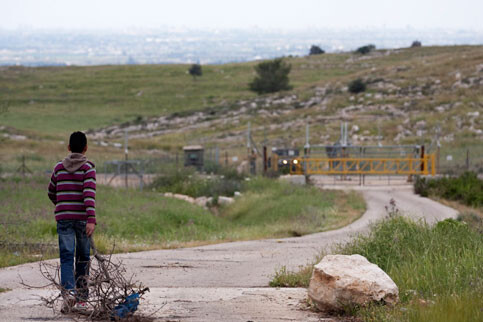The Electronic Intifada 6 April 2010

Palestine will be an issue at the forefront of this year’s US Social Forum. (Shachaf Polakow/Activestills)
The global movement to realize Palestinian equal rights, self-determination and the opportunity for refugees and their descendants to return to Palestine is gaining increased momentum. As Israel continues its attempt to systematically purge the memory of the indigenous Arab Palestinians from the historic land of Palestine through an exclusionary political system, home demolitions, settlement construction, military occupation and a fierce siege of the Gaza Strip, people across the globe are taking action and defending the natural right of Palestinians to live a dignified and free existence.
Thanks to committed students and activists, the boycott, divestment and sanctions (BDS) movement is putting unprecedented amounts of attention and pressure on Israeli apartheid. Moreover, mainstream international human rights organizations like Amnesty International and Human Rights Watch have unequivocally exposed Israel’s human rights abuses in the occupied West Bank and Gaza Strip, and the UN-commissioned Goldstone report has thrust Israel into the international spotlight for its wanton disregard for civilian life and its dismissal of well-established international law during its invasion of Gaza last winter.
While existing conditions have fueled the grassroots movement aimed at delegitimizing racist policies and shattering Israeli impunity in order to realize Palestinian freedom and dignity, they have yet to establish Palestine as an integral component of the social justice movement’s agenda in the US. Doing so requires that the pro-Palestinian movement build meaningful alliances with other organizations, communities, movements and individuals that are also struggling to achieve social justice. The movement is poised to take advantage of that opportunity at this year’s United States Social Forum (USSF).
From 22-26 June, the second USSF will convene at Detroit’s Cobo Hall. The slated purpose of this forum is to provide “a space to build relationships, learn from each others experiences, share our analysis of the problems our communities face, and bring renewed insight and inspiration to social movement organizations.” Rather than being a conference with a slated agenda, the USSF is a “mass movement convergence where we produce our own agenda, our own program, and our own solutions to change.”
Detroit was intentionally selected as the location for this year’s forum. If we are serious about addressing and recognizing the intersectionality of the issues confronting disenfranchised and historically oppressed communities across the country, then we must win Detroit. Detroit not only represents an intense movement for social, racial, gender and economic justice, but it also reveals the failure of the current economic and social order to foster an environment that encourages freedom and equality.
The USSF’s National Planning Committee (NPC) is dedicated to creating a space wherein the struggles of communities of color and indigenous populations can be heard and deliberately addressed. The participation of the United States Palestinian Community Network (USPCN) in the NPC signifies a momentous shift for both the Left movement in the US as well as for Palestinian rights activism.
Through Palestinian community participation, we aim to encourage the US-based Left movement to integrate the Palestinian struggle for self-determination into its analysis and work. Conversely, participation allows Palestinian rights advocates as well as Palestinian-Americans who struggle for their labor, housing, immigrant, racial and criminal justice rights, to align themselves more firmly within the Left to build another world together. USPCN sees many roles that the Palestinian and Arab community in the US could and should play at the USSF, including but not limited to: asserting the Palestinian narrative in discussions of Palestine’s liberation and its connection to the overall social justice movement; building alongside, and in solidarity with, other social justice movements in the US; and cultivating Palestinian and Arab leadership and participation in various pursuits for social justice in the US.
In its capacity as a NPC member, the USPCN seeks to ingrain the struggle for Palestinian equality, freedom and dignity at the USSF by coordinating a Palestine Track of participant-led workshops; by hosting a Palestine Tent featuring merchandise, family events, performances and networking opportunities; and facilitating the convergence of civil society actors including, but not limited to, university students engaged in divestment campaigns on campus.
However, our efforts will only be successful if we, as Arabs, Arab Americans, and Palestine activists alike, work hard to get as many people possible to attend the forum from our respective communities and organizations. In order to achieve this goal, we are encouraging Arabs and Palestinians to organize caravans and road trips to come out in large numbers to Detroit. We are also actively encouraging people to submit workshop proposals and ideas for cultural events. The USSF provides a unique and timely opportunity for us to broaden our understanding of social justice activism, and make connections between Palestine and other social justice issues.
Andrew Dalack is a graduating senior at the University of Michigan, and has been working on behalf of USPCN to stimulate local Arab outreach efforts in the Dearborn/Detroit area.
Related Links



